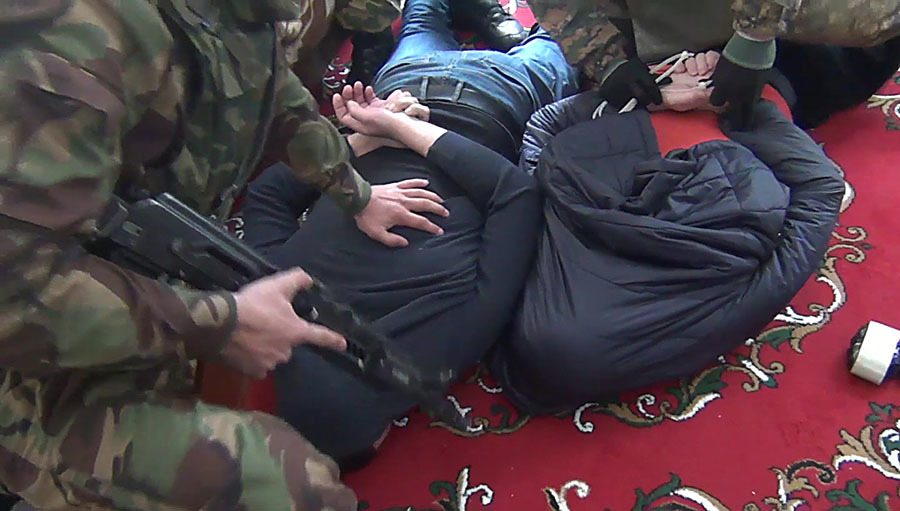In 2019, 13 international terrorist cells were suppressed in the CIS countries. This was stated by Director of the FSB of Russia Alexander Bortnikov at the 47th meeting of the Council of Heads of Security Agencies and Special Services of the Commonwealth Countries (SORB) in Tashkent.
“This year, in cooperation with partners from Azerbaijan, Tajikistan, Kyrgyzstan and Uzbekistan, the activity of 13 cells of international terrorist structures has been identified and suppressed. 138 militants were detained, ”Bortnikov said.
Thanks to the joint activities of the special services of the Commonwealth, from May to October, more than 200 people suspected of involvement in terrorist or religious extremist organizations were brought to the border control. A significant amount of narcotic and psychotropic substances was also withdrawn from circulation. Thanks to joint work with the KGB of Belarus, the special services blocked the channel for the illegal supply of weapons, seized more than 40 pieces of firearms and 9 thousand of ammunition.
The director of the FSB of the Russian Federation warned that the terrorist organizations of Afghanistan, which are planning expansion into the CIS countries, are currently at risk. At the same time, they will carry out their activities with the help of militants from among citizens of the Central Asian republics.
“We record the growing activity of the IG * units in Afghanistan, united in the so-called“ Vilayat Khorasan ”. “Jamaat Ansarullah” and “Islamic Movement of East Turkestan” operate in close connection with him, ”he explained.
Thus, according to Bortnikov, the primary task at the moment is "ensuring the security of the southern borders of the Commonwealth states."
Ways in the CIS
The ranks of the militants are often replenished by members of their families. The FSB has at its disposal data from about 2 thousand Russians who have passed the hot spots in the Middle East and who could potentially begin to carry out terrorist activities in Russia. Among them are the wives and children of the militants. Often they enter the Russian Federation through humanitarian corridors.
"Such" returnees "often act as carriers of religious extremist ideology and are considered by the leaders of international terrorist organizations (MTO) propagandists as suicide bombers, propagandists and recruiters, agents of an underground terrorist network," said the director of the FSB of the Russian Federation.
- RIA News
- © FSB of the Russian Federation
The militants themselves choose illegal routes of entry into the CIS countries to return. According to the FSB, once in the appointed place, they receive the support of local criminal groups and corrupt officials. So the terrorists begin to form clandestine cells and recruit new supporters.
Bortnikov called on the CIS special services to intensify cooperation and strengthen monitoring of citizens who have passed hot spots. In addition, entry-exit channels should be closely monitored and preventive measures should be taken among migrants.
Recruitment
Bortnikov also said that terrorists exploit the vulnerability of certain sections of society to attract them to their ranks. The objects of criminals are labor migrants, foreign students and prisoners. Young people are influenced by religious extremist sermons.
“A special risk group is young people who are affected by extremist ideologies. Its processing is carried out during sermons and lectures of the radical clergy, given in religious institutions, mainly acting informally, ”the director of the FSB of Russia noted.
For a wider audience, lectures are posted on the Internet. In addition, according to Bortnikov, criminals conduct online distance training for potential terrorists.
“Using the means of encrypted Internet communication, jihadists create closed network communities where they conduct psychological processing of neophytes and remotely teach methods of conducting terrorist activities. Participants in such communities are direct candidates for single terrorists, ”he stressed.
Threat from the West
The head of the FSB of Russia noted that the terrorists are almost defeated in Syria and Iraq, so they are moving to other regions, such as Asia and Africa. In Europe, a network of sleeping cells is being formed.
According to Bortnikov, one should pay attention to the political threat that comes from the West. A number of non-governmental organizations are trying to undermine the internal situation in the CIS countries.
“Foreign and international non-governmental organizations are a traditional tool for such interference in the internal affairs of independent states,” he stressed.
* “Islamic State” (ISIS, ISIS) - the organization was recognized as terrorist by decision of the Supreme Court of the Russian Federation of December 29, 2014.

